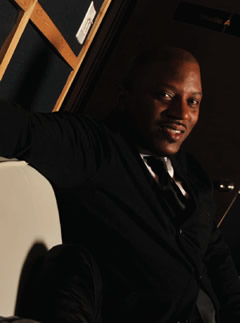


GORDEN CAMPBELL LITERALLY CANNOT REMEMBER A TIME when he didnít want to be a drummer. By age five he was accompanying the services in the Newburgh, New York, gospel church, where his grandfather served as pastor. “He had 13 kids, so all my aunts and uncles had something to do, like directing the choir or playing organ,” he says. “And theyíre all still playing.”
And so is Campbell. Today heís a leading session drummer in Los Angeles, with such credits as Earth, Wind & Fire, Beyoncť, Whitney Houston, 50 Cent, Mary J. Blige, Jessica Simpson, Chris Brown, and many other R&B, hip-hop, and pop acts.
Secular music was forbidden in the religious Campbell home, but Gorden caught the pop music bug from late-’70s and early-’80s hits on the car radio. “I heard lots of things I liked, like Steely Dan, but I didnít learn who the artists actually were ’til years later,” he recalls.
Campbell attended Washington, D.C.’s Howard University, where he studied with legendary jazz drummer Grady Tate. He majored in jazz studies, but also mastered such classical techniques as timpani and four mallet playing for vibes and marimba. “My studies made me versatile,” he says. “Thatís important in this business. Unless youíre playing in a successful band, you have to play a lot of styles to be able to work regularly. People know they can call me for any gig, and Iíll make it feel good and sound authentic.”
I love Yamaha drums for their tone and consistency.
Feel and authenticity are important for any drummer, but especially so for Campbell, who specializes in collaborating with hip-hop, pop, and R&B artists whose recordings are usually created without live drums. As a result, his playing often walks a fine line between replicating hit records and adding a high-adrenaline human touch. Thatís definitely the case with the numerous American Idol singers Gorden has worked with.

“These days I perform along with prerecorded tracks 90% of the time,” he says. “Itís harder than it sounds, because machines are perfect and weíre not. You have to get as close as possible to the feel of the machine, because most artists want the live performance to feel as much as possible like their records, but with a little extra human excitement.”
Getting it right requires practice. “I usually start by learning the patterns verbatim, even if itís not the sort of part a drummer would naturally play,” says Gorden. “Then I practice to the point where Iíve learned it in muscle memory, and you can hardly tell the difference between live playing and the program. After that, I start adding live fills, but making sure that when I get back to the pattern, itís exact.”
Campbell is a longtime Yamaha drum endorser. “I love Yamaha drums for their tone and consistency,” he says. “A lot of times on tour I use rental kits; and with Yamaha, I never worry about them sounding good. And they sound great with any type of heads, as opposed to a lot of other drums, which only sound good with one particular type.”
These days, Gordenís main kits are the Oak Custom he tours with and the Absolute Birch that resides in his studioóthough after using a PHX kit on a recent George Duke session, he plans to get one of those as well. “Everyone at the sessionóthe musicians, the engineers, everyoneówas amazed by how round and full it sounded. The PHX is just an amazing set.”
Gorden details his preferred setup: “I use a 22” kick drum, though I sometimes use a 20”. I use either a 13” or 14” snare, and I usually have a 13” or 10” side snare to the left of the hat. My toms are usually 8”, 10”, and 12” rack, and 14” and 16” floor. I play left-handed on a right-handed kit, so my ride is on the left side, over the 8” tom.”
Campbellís primary snare these days is an older 14” x 5 Ĺ” Paul Leim Signature. “It sounds incredible,” he says. “I also like the Manu Katchť snare; and I use a couple of Musashis, which are great because you can tune them high or low. Thatís what I used on the last American Idol tour I did. I also have an amazing Sensitive Series wood snare in my studio.”
Gorden has just released an instructional DVD that demystifies some of his hard-won skills, from playing effectively with other musicians to getting and keeping gigs. “Itís called Secrets of the Working Drummer, because thatís what it is,” he explains. “It includes a lot of information that professional players know, but the average kid might not. I talk a lot about the musical responsibilities we have as drummers, because the drummer is the foundation of the band.” You can order the DVD while visiting Gordenís website, gordencampbell.com.
(Photography Credit: Rob Shanahan)
























